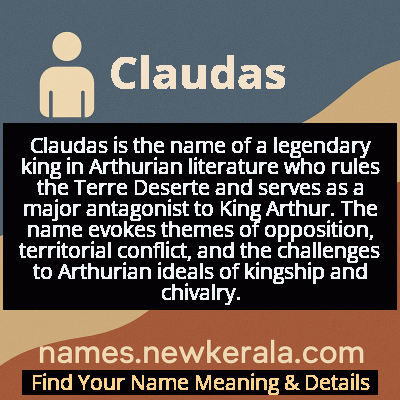Claudas Name Meaning & Details
Origin, Popularity, Numerology Analysis & Name Meaning of Claudas
Discover the origin, meaning, and cultural significance of the name CLAUDAS. Delve into its historical roots and explore the lasting impact it has had on communities and traditions.
Name
Claudas
Gender
Male
Origin
Arthurian
Lucky Number
7
Meaning of the Name - Claudas
Claudas is the name of a legendary king in Arthurian literature who rules the Terre Deserte and serves as a major antagonist to King Arthur. The name evokes themes of opposition, territorial conflict, and the challenges to Arthurian ideals of kingship and chivalry.
Claudas - Complete Numerology Analysis
Your Numerology Number
Based on Pythagorean Numerology System
Ruling Planet
Neptune (Ketu)
Positive Nature
Intuitive, analytical, spiritual, and inquisitive.
Negative Traits
Secretive, reserved, aloof, and can be overly critical.
Lucky Colours
Green, yellow.
Lucky Days
Monday.
Lucky Stones
Cat’s eye, moonstone.
Harmony Numbers
1, 5, 6.
Best Suited Professions
Scientists, researchers, spiritual leaders, detectives.
What People Like About You
Depth of knowledge, analytical skills, spirituality.
Famous People Named Claudas
King Claudas
Legendary Monarch
Ruler of the Terre Deserte who fought against King Arthur and the Knights of the Round Table
Claudas de la Deserte
Literary Character
Prominent antagonist in the Lancelot-Grail cycle and Post-Vulgate Cycle
Claudas the Usurper
Fictional King
Known for his conflicts with Kings Ban and Bors, and his role in Lancelot's backstory
Name Variations & International Equivalents
Click on blue names to explore their detailed meanings. Gray names with will be available soon.
Cultural & Historical Significance
His role extends beyond mere villainy, representing the political realities and territorial disputes that characterized medieval feudal systems. Claudas embodies the challenges faced by rulers in maintaining their domains and the constant threat of usurpation that defined medieval power structures. As a character who persists through multiple Arthurian cycles, he demonstrates the literary tradition's need for consistent external threats to highlight Arthur's virtues and the Round Table's ideals. His enduring presence across centuries of Arthurian retellings underscores his importance as a narrative device for exploring themes of kingship, loyalty, and the costs of maintaining peace and order in a violent world.
Extended Personality Analysis
In Arthurian tradition, Claudas is typically portrayed as ambitious, cunning, and politically astute. He demonstrates strong leadership qualities and military prowess, capable of commanding loyalty from his followers while posing a genuine threat to Arthur's sovereignty. His character exhibits strategic thinking and persistence, as seen in his long-standing conflicts with neighboring kingdoms and his ability to maintain power despite opposition from Arthur's knights. These traits make him a credible antagonist whose challenges force Arthur and his knights to prove their worth and strengthen their bonds.
However, Claudas also embodies negative traits including ruthlessness, territorial ambition, and a willingness to use deception and force to achieve his goals. His personality reflects the complex nature of medieval kingship, where strength and determination were necessary for survival, yet could easily cross into tyranny when unchecked by moral constraints. This duality makes him a compelling antagonist whose motivations, while often antagonistic to Arthur's ideals, stem from understandable desires for power and security in a dangerous political landscape. His character serves as a foil to highlight the virtues of Arthur's court while also demonstrating that the line between strong leadership and tyranny can be perilously thin.
Modern Usage & Popularity
The name Claudas remains extremely rare in modern times, primarily appearing in scholarly discussions of Arthurian literature and among enthusiasts of medieval legends. It has not gained popularity as a given name in contemporary naming practices, likely due to its strong association with a villainous character and its archaic sound. The name occasionally surfaces in fantasy literature and role-playing games that draw inspiration from Arthurian mythology, but it maintains niche status. Its usage is largely confined to academic contexts, historical fiction, and specialized interest groups rather than mainstream naming trends. The name's distinct medieval flavor and literary pedigree make it appealing to those seeking unique, historically-rooted names with strong narrative connections, though its negative connotations in the original stories limit its broader appeal.
Symbolic & Spiritual Meanings
Symbolically, Claudas represents opposition, territorial ambition, and the challenges to established order in Arthurian cosmology. As ruler of the Terre Deserte (Land of Waste), he embodies the concept of barrenness and desolation, both literally in his kingdom's name and metaphorically in his role as an antagonist to Arthur's fertile reign. His character symbolizes the political realities that threaten idealistic governance, serving as a necessary counterpoint to Arthur's utopian vision. Claudas also represents the theme of usurpation and the complex nature of kingship, where legitimate rule is constantly tested by ambitious rivals. In broader symbolic terms, he stands for the external pressures and conflicts that strengthen a kingdom through adversity, making him an essential component in the Arthurian narrative's exploration of power, loyalty, and the costs of maintaining order against forces that would dismantle it.

